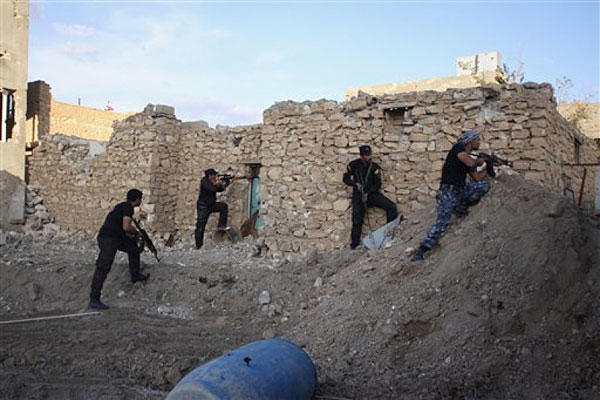ISIS fighters who fled to the terror group's Iraqi stronghold of Mosul after being defeated in Ramadi were burned alive in the town square, sources told FoxNews.com, in an unmistakable message to fighters who may soon be defending the northern city from government forces.
Several residents of Mosul recounted the grisly story for stateside relatives, describing the deadly reception black clad jihadists got when they made it to Mosul, some 250 miles north of the city retaken by Iraqi forces operating with cover from U.S. air power.
"They were grouped together and made to stand in a circle," a former resident of northern Iraq now living in the U.S. but in touch with family back home told FoxNews.com. "And set on fire to die."
Several Iraqi-Americans and recent refugees with close relatives in Mosul told of ISIS fighters fresh off defeat in Ramadi being shunned -- and executed -- for not fighting to the death in Ramadi.
Michael Pregent, a terrorism expert and former intelligence adviser to Gen. David Petraeus in Iraq, said such an act isn't new for the callous terror group. A similar fate was meted out to fighters who lost Saddam's hometown to Kurdish forces last year.
"There is no surprise on executing ISIS fighters from Ramadi," he said. "They did the same to fighters after Tikrit."
The retaking of Ramadi, the capital of the mainly Sunni-populated Anbar Province which ISIS took over last May, was a major setback for ISIS. Just 80 miles west of Baghdad, the city was overrun by ISIS in June, 2014. Iraqi forces, fighting with Sunni tribes and supported by coalition forces, recently took it back but the city remains in ruins. Booby-traps, landmines and a broken infrastructure have rendered it mostly uninhabitable for the time being.
With government, Kurdish and coalition forces now mustering to recapture Mosul, which fell to ISIS approximately 18 months ago, an increasingly paranoid ISIS has stepped up its murders of women and children, according to people trapped in the city.
"They come to the house and take the children and accuse them of being spies," said a stateside Iraqi with knowledge of the situation. "If the mom cries and gets upset at them, they accuse of her being a spy too and take her to the jail and later kill her."
The terrorist group is feeling the heat of a coming onslaught, said Pregent.
"ISIS is fracturing, paranoid from within," Pregent continued, noting that ISIS has two intelligence directorates -- one for internal threats the other for external ones -- and both are focused on unearthing "threats" to their existence within areas under their thumb. "They are using women and children executions to intimidate -- the harsher the tactic the more desperate the leadership is."
Clint Watts, Fox fellow of the Foreign Policy Research Institute, agreed.
"They continue to lose territory, we've seen a growing number of defections and a rise in the number of alleged internal spies -- many of whom they have killed mercilessly without demonstrating significant evidence of internal espionage," he explained. "ISIS pattern of internal killings looks remarkably similar to al Shabaab's decline in Somalia. As Shabaab lost ground and defectors increased, internal killings and harsher punishments were meted out across the terror group further accelerating the loss of local popular support."
Earlier this year, activist group Mosul Eye reported that ISIS committed mass executions of men and children at Alhud Village just south of Mosul, accusing the entire township of apostasy and affiliation to the local Iraqi police forces. In late December, several teenagers aged between 12 and 16 were reportedly caught trying to flee across the Tigris River toward the Kurdish region, and subsequently accused of being "spies" by ISIS and within minutes publicly executed in front of their families.
As it stands, communications within the besieged city remain spotty, but many are able to get messages out via telephone or Internet -- although at great risk.
"The residents have little electricity or water, there is no salary for people working, there are no medicines to cure illnesses," another insider based in Iraq observed. "Civilians are in a state of despair.
"Everyone just lives their lives in complete fear," he said. "They don't know who will be next -- man, woman or child."


























